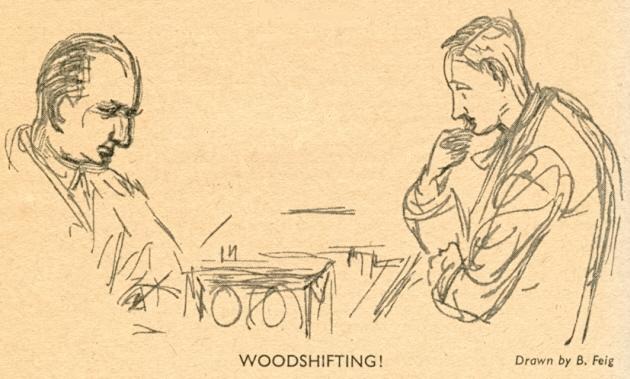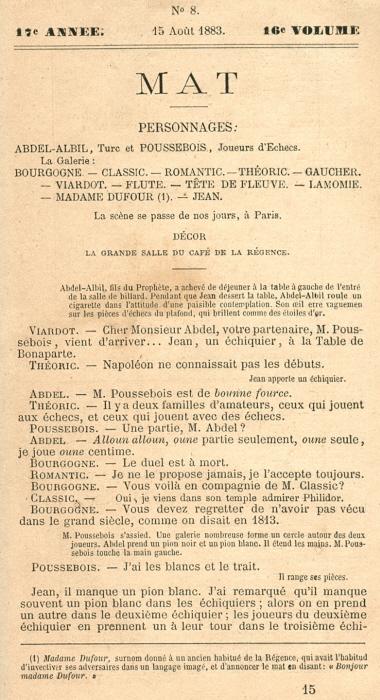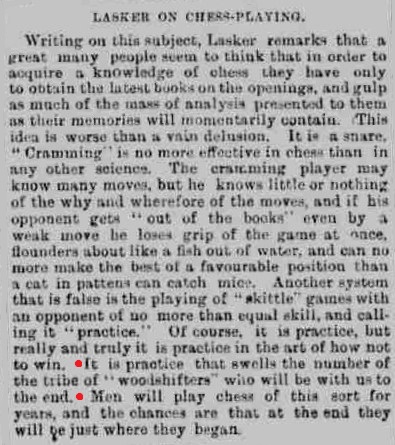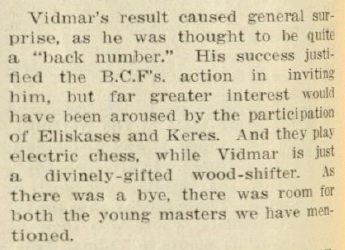
Edward Winter

G. Wood and B.H. Wood. See C.N. 7425.
The term ‘woodshifting’ gained some prominence after Blackburne had been interviewed by Brian Harley in the Observer (4 December 1921, page 9) and had called the games of that year’s world championship match ‘superior woodshifting’. Capablanca responded on page 7 of the 15 January 1922 edition (see pages 115-116 of our book on him).
When exactly the word had joined the ranks of common chess parlance is difficult to say. Pages 152-153 of the September 1908 Lasker’s Chess Magazine quoted an article from the Yorkshire Weekly Post which began:
‘The member of a chess club is apt to consider himself the chessic salt of the earth, and to feel mildly patronizing towards that vast army of insouciant wood-shifters who like to take their chess at the rate of four games an hour.’
The term cropped up again on page 21 of the November 1908 issue of Lasker’s Chess Magazine, in an anecdote which began ‘Loyd met a conceited “wood-shifter”, and accepts his bet that …’
In a note to a game on page 6 of the January 1905 American Chess Bulletin, C.S. Howell wrote, ‘Wood shifting as distinguished from chess’.
How much further back it is possible to go is an open question, but we note on page 354 of the 15 December 1895 La Stratégie this French version of a remark by Tarrasch concerning Hastings, 1895 which takes us back to Blackburne:
‘Teichmann et Bardeleben se sont partagé le 7e prix: résultat fort imprévu quant à celui-ci, lorsqu’on songe à son récent match avec Blackburne; dans cette rencontre, les deux adversaires poussaient du bois d’une façon si incroyable qu’on se demandait si c’était bien aux échecs qu’ils jouaient.’
The original German version of the article (General Anzeiger, 29 September and 6 October 1895 – see also page 39 of Schallopp’s book on Hastings, 1895) mentioned pushing, but not wood:
‘In den 7. Preis teilten sich v. Bardeleben und Teichmann. Von Herrn v. Bardeleben hätten wohl Wenige diesen Erfolg erwartet, besonders mit Rücksicht auf seinen kurz vorhergegangen Wettkampf mit Blackburne, in welchem die beiden Spieler in einer so unglaublichen Weise die Schachfiguren schoben, dass man unser geistreiches Spiel kaum wiedererkennen konnte.’
Page 306 of E.R. Brace’s An illustrated Dictionary of Chess (London, 1977) listed woodthumper as ‘another name for a woodpusher’, despite its rougher overtones. Early citations for such words as woodshifting and woodpushing will be welcomed, and we should not close without quoting the following from the obituary of William Pugh (1855-1935) on pages 113-114 of the March 1936 BCM:
‘One of the most chivalrous of players he was always ready to help with friendly criticism and encouragement young aspirants – “wood shufflers” as he playfully termed them …’
(3184)
From pages 60-61 of Everybody’s Guide to Chess and Draughts by H. Peachey (London, 1896):
‘My advice to you as a young player is, pay chief attention to attack, for you will learn far more by doing so. Try and have an object in every move you make. Do not bother about your own king too much whilst learning the game, but go for your opponent’s. When experience has come to you you can judge for yourself. You may then if you choose, although I trust you will not, play that slow “wood-shifting”, “stone-wall” kind of game that is, I regret to say, adopted by so many, but, for the present at any rate, play lively and “make things hum”.’
(3198)
Stewart Reuben (Twickenham, England) writes:
‘I have never seen the following term used in print or, indeed, used in any way for many years. However, around 1957 Bert Hopkins (now, alas, long dead) was kibitzing the post mortem of one of my games in the Middlesex Junior Championship. There were mass exchanges. He referred to the players as “furniture removers”. I have no idea whether this was common parlance at one time. I hope to find the occasion to employ it in the future.’
(3206)
From page 9 of Mr Blackburne’s Games at Chess by P. Anderson Graham (London, 1899):
‘The most ordinary “wood-shifter”, by long study and analysis, can acquire a steady defensive style of wood-shifting, and if patient and fairly intelligent can work up to a high standard of play.’
(3268)
In this little series there have already been references to woodpushing, woodshifting, woodshuffling and woodthumping. Now, from page 9 of the Chess Weekly, 5 December 1908, comes another one:
‘These are all played in the same “Woodchopping” obligato style and, as chess games, do not deserve publication except as objects for well merited criticism …’
(3340)
From an article by James Mortimer on page 66 of the Chess Monthly, November 1892 (C.N. 3366; see pages 218-219 of Chess Facts and Fables):
‘In my hours of leisure, I went almost every day to the Régence, to do a little “woodshifting” with some mazette (duffer) of about my own feebleness, or occasionally to pay half a franc for the privilege of being beaten at the odds of rook or knight by any professional “artist” or strong amateur who would graciously condescend (for fivepence a lesson) to show me “how it was done”.’
(3366)
The term ‘wood-thumpingitis’ was in an article by Bruce Hayden on pages 106-107 of the April 1951 Chess Review which was reprinted, with a few textual changes, on pages 9-15 of his book Cabbage Heads and Chess Kings (London, 1960):
‘In 1947, Harold [Lommer] went into partnership with one Boris Watson, a fellow addict. Boris, a gentle, scholarly man of precise speech, is a tall, majestic figure of 20 stone who suffers from wood-thumpingitis of the right arm – he’s an enthusiastic wood-thumper and likes nothing better than to moor himself solidly against a chess table and play quick skittles. Harold gives Boris the odds of ten stone and a knight ...’
Morgan Daniels (London) points out that woodpushing was mentioned in Le neveu de Rameau by Denis Diderot (1713-84):
‘Il m’aborde. “Ah, ah, vous voilà, monsieur le philosophe, et que faites-vous ici parmi ce tas de fainéants? Est-ce que vous perdez aussi votre temps à pousser le bois?” C’est ainsi qu’on appelle par mépris jouer aux échecs ou aux dames.’
Our correspondent gives the following English version from page 36 of the 1966 Penguin edition of Rameau’s Nephew, translated by Leonard Tanock:
‘He accosts me ... “Aha, there you are, Mr Philosopher, and what are you doing here among all this lot of idlers? Are you wasting your time, too, pushing the wood about?” (This is a disparaging way of referring to the games of chess and draughts.)’
We add that pages 144-145 of King, Queen and Knight by N. Knight and W. Guy (London, 1975) gave the above passage ‘translated by Professor Raoul Gaudin for the compilers’. Or is it the same passage? No reference to draughts is included, and the text reads, ‘Are you also losing your fame in wood shifting’.
(4325)
As regards the atmosphere of Blackburne’s displays, the following comes from page 286 of the July 1899 BCM:
‘Some simultaneous players pace from board to board as if engaged in a matter of life and death importance, and with a very serious – not to say sombre – funeral appearance. Not so Blackburne, for he contrives to make it a merry performance. He bubbles over with humour, he has flashes of fancy and plays off wit. He annotates each move as he goes along, and the annotations are calculated to make even the losing player laugh and be on good terms with himself. The player loses his game but does not lose his self respect; and this is important at chess. Blackburne has a delicate way of dealing with his opponents in simultaneous performances, and is not without a warm corner of estimation even for the despised “wood-shifter”.’
(4815)
From Rod Edwards (Victoria, BC, Canada):
‘Regarding C.N. 4325 and previous items on woodpushers, woodshifters, etc., I have come across an early version of a similar term, although not as old as the eighteenth-century quote from Diderot. Page 162 of Etienne Cornil’s treatise on the Café de la Régence (C.N. 5241) gives the first page of a play, “Mat” by Charles Joliet, in which there was a character named Poussebois, a chessplayer.’
Below is the first page of the play, as published on pages 225-232 of La Stratégie, 15 August 1883:

The text can also be found in the Traité-manuel des échecs by Henri Delaire (e.g. on pages 188-198 of the Paris, 1917 edition). The obituary of Charles Joliet (1832-1910) on page 64 of the February 1910 issue of La Stratégie showed that he was a prolific literary figure.
(5378)
Dan Scoones (Port Coquitlam, BC, Canada) writes:
‘C.N. 5378 reminded me of the short story “A Strange Simultaneous Display” by Marc Benoit on pages 203-208 of The Best In Chess by I.A. Horowitz and Jack Straley Battell (New York, 1965). The protagonist, Holz Schieber, fresh from a match victory over the Russian player Tolkai Derevyachkou, is induced to give a simultaneous exhibition against two local players in the small Quebec town of Poussebois. Schieber’s opponents conspire to copy the master’s moves so that, in effect, he is playing against himself. To subvert the plot he deliberately makes an illegal move on the first board. The second opponent dutifully follows suit, and Schieber immediately demands that the second opponent correct the illegal move. This allows him to send the two games down different paths, but it is all for nothing because he ends up losing both games. Of course, the names Holz Schieber, Tolkai Derevyachkou and Poussebois all translate (more or less) as “woodpusher”.’
The story had been published on pages 108-109 of the April 1954 Chess Review.
(5567)
‘Chess is more than a mere game, and those who “play” at it are known to the really expert as “woodshifters”.’
Source: New Era Illustrated Magazine, quoted on page 163 of the March 1905 American Chess Bulletin (C.N. 3120 – see Chess and Jews.)
Further citations:
‘Altogether there were 88 competitors, in five classes, there being, in addition, a class for “woodshifters”, which is the designation for novices in the game.’
Source: Leeds Mercury, 25 January 1886, page 7.
From the Belfast News-Letter, 4 May 1893, page 3:

A game annotation by Taber on page 16 of the American Chess World, January 1902:
‘Proving Mr Corchran a player whose chess is not of the ordinary wood shoving variety.’
‘Vidmar is just a divinely-gifted wood-shifter.’
That comment was by C.J.S. Purdy in the Australasian Chess Review, 12 November 1936, page 290, in an article on that year’s Nottingham tournament:

To the Chess Notes main page.
To the Archives for other feature articles.
Copyright: Edward Winter. All rights reserved.